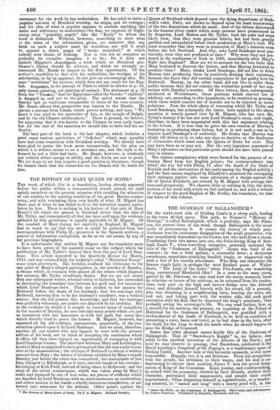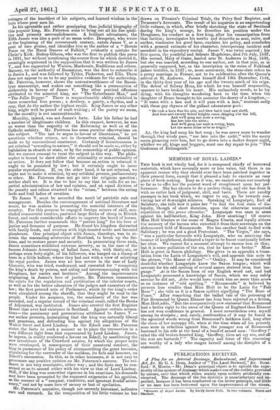THE GUDEMAN OF BALLANGEICH.*
ON the north-west side of Stirling Castle is a steep path, leading to the town of that name. This path, in Nimmo's "History of Stirling," is called Ballocligiech, which is probably, says Mr. Pater- son, the correct form of the word, though Ballangeich is the usual mode of pronouncing it. It means the stormy or windy pass. Gudeman was the customary designation of the small proprietor, who was immediately dependent on the Crown, but who held from a vassal. Combining these two names into one, the frolic-loving King of Scot- land, James V., when travelling incognito, generally assumed the title of the " Gudeman of Ballangeich." James was fond of ad- venture; he was a bold gallant; a successful lover; a dexterous swordsman, sometimes attacking banditti singly, or supported only with a few of his courtly attendants. Who does not remember the famous single fight, in perhaps the most finished poem of Walter Scott, " The Lady of the Lake," when Fitz-James, our wandering king, encountered Rhoderick Dhu ? In a note to the same poem, quoted by Mr. Paterson, we may read how the merry monarch, beset by relations or lovers of his mistress, as he returned from his rendez- vous, tookpost on htlIseMligh and narrow bridge over the Almond river, and defended bravely with his sword, till a peasant, who was thrashing in a neighbouring barn, hearing the noise, sal- lied out, and taking part with the weaker side, did such good execution with his flail, that he dispersed the king's assailants, thus probably saving his sovereign's life. We may read further, how, as a reward for his services, the peasant, on inquiring at the Palace of Holyrood for the Gudeman of Ballangeich, was gratified with a crown-charter of the lands of Braehead, to be held on condition of presenting a ewer, basin and towel, as he had done in the barn, after the broil, for the king to wash his hands when he should happen to pass the Bridge of Crainond. James has other pleasant names beside this of the Gudeman of Ballangeich. That of " Snowdoun's Knight" is, we believe, due solely to the poetical invention of the Ariosto of the North; and here we may observe in passing, that Snowdoun, celebrated in Sir David Lyndsay's Complaint of the Paping's, is a traditionary name of Stirling Castle. Another title of thislevourite monarch, is still more honourable. Happily, too, it is not fictitious. From his sympathies with the people, his attention to their wants, and his zeal in en- deavouring to elevate their position, James V. won the proud desig- nation of King of the Commons. Kind, jocular, and condescending, he mixed with the peasantry, chatted by their fireside, studied their character, patronized their amusements, and sought their social improvement. Often disguising himself as a gaberlunzie, or a wander- ing minstrel, he "ranted and sang" with a hearty good will, in the • James the Fifth; or, the Gudeman of Ballangeich. His Poetry sad Adventures By James Paterson. Published by Simpkin, 31 arshall, and Co. cottages of the humblest of his subjects, and learned wisdom in the huts where poor men lie.
In his agreeable and rather gossipping than judicial biography of this popular king, Mr. Paterson aims to bring out all his fine quali- ties and princely accomplishments. A brilliant adventurer, the Fifth James was also a poet of no mean order. Dempster, who wrote at the beginning of the seventeenth century, extols James V. as a poet of rare genius, and identifies him as the author of a " Heroic Poem on the Rural Dances of Falkirk," evidently a mistake for Christ's Kirk. Bishop Gibson, who was the first to publish this poem in 1691, but without mentioning the source from he which derived it,
seemingly• acquiesced in the supposition that it was written by James V., and was supported by Watson, Mackenzie, Ruddiman and others. Ramsey, on the authority of Bannatyne, was the first to subscribe it to James L, and was followed by Tytler, Pinkerton, and Ellis. There does not appear to us to be any positive evidence for the authorship. Mr. Paterson, however, shows the untrustworthiness of the Benne- Vac manuscript, and makes out something like a presumption of authorship in favour of James V. The other poetical effusions attributed to the minstrel king, are "The Gaberlunzie Man," and "The Jollie Beggar." There is unquestionable ability exhibited in these somewhat free poems ; a drollery, a gaiety, a rhythm, and a song, that do the author the highest credit. King James or any other king, might well be proud of such writing; of the poetry we mean, for the morality is not unexceptionable.
Morality, indeed, was not James's forte. Like his father he had a number of illegitimate children. In this respect, however, he was no worse than the majority of the Reforming as well as of the Catholic nobility. Mr. Paterson has some peculiar observations on this subject. "The last to argue in favour of libertinism," he yet questions whether crimes, not in themselves criminal, should be made so by conventional enactment. Certainly if licentiousness is not criminal "according to nature," it should not be made so, either by legislation in church or state, or by the censorship of public opinion. But we cannot consent to treat the subject in this way. The philo- sopher is bound to show either the criminality or non-criminality of an action. It does not follow that because an action is criminal it ought to be punished by law; but it certainly ought to incur popular reprobation. If ,on the other hand, it be not criminal, we ought not to make it criminal, by any artificial process, parliamentary or other. Mr. Paterson does not go into the religious question; neither shall we. It is due to him to say that he calls for an im- partial administration of law and opinion, and an equal division of the penalty and odium attached to the "crime," between the erring lords and frail ladies of creation.
To James V. must be accorded the merit of patriotic rule and management. Besides the encouragement of national literature and music, he was zealous in promoting the material interests of the country. For this purpose he engaged foreign miners of skill, con- cluded commercial treaties, pastured large flocks of sheep in Ettrick forest, and made considerable efforts to improve the breed of horses. Mr. Paterson further commends this " patriot king" for his love of justice and firmness of purpose. He found his kingdom distracted with family feuds, and overrun with high-handed noble and baronial plunderers. One principal object with James, therefore, was to re- strain the marauding aristocrats of Scotland, to break up the fac- tions, and to restore peace and security. In prosecuting these ends, James sometimes exhibited extreme severity, as in the case of the famous Johnnie Armstrong, of ballad fame, who, with thirty-six, or perhaps even forty-eight, of his followers, was hanged on a clump of trees in a little hollow, where they had met with a view of soliciting the royal pardon. James was no less severe in the case of Lady Glammis, who was tried, condemned, and executed for " conspiring the king's death by poison, and aiding and intercommuning with the Douglases, her uncles and brothers." Among; the improvements originating in James's love of justice, Mr. Paterson enumerates the edicts for the regulation and purification of the inferior courts, as well as for the better education of the judges and executors of the law; the first printed acts of Parliament, which by the king's order were circulated among the sheriffs, that they might be read to the people. Under his auspices, too, the machinery of the law was amended, and a regular record of the criminal court, called the Books i
of Adjournal, was instituted. James also erected the first Register House that ever had existence in Scotland. Against certain accusa- tions—the parsimony and persecutions attributed to James V.— our author protests, maintaining that the king was naturally liberal and generous, and defending him against the allegations of Sir Walter Scott and Lord Lindsay. In the Edzell case Mr. Paterson states the facts in such a manner as to place the transaction in a very different light from that represented by Lord Lindsay. James, he argues, in reality conferred a favour on Edzell, by sanctioning the new investiture of the Crawford estates, by which the proper heirs were overleaped, in consequence of their unnatural conduct, the king in pursuance of his policy of eireurascribing the great baronies, stipulating for the surrender of the earldom, its fiefs and honours, on. Edzell's succession. In this, as in other instances, it is not easy to pronounce any positive opinion on Mr. Paterson's success. The evi- dence is not very conclusive, either way ; and the facts may be con- dined so as to accord either with his view or that of Lord Lindsay. Still, if the king was somewhat rigorous in his exactions, his demands may have been prompted by the supposed exigencies of his p2sition, as the coercer of a "rampant, vindictive, and ignorant feudar aristo- cracy," and not by mere love of money or lust of spoliation.
Mr. Paterson's narrative, though not severely historical, indicates care and research. In the composition of his little volume he has
drawn on Pitcairn's Criminal Trials, the Privy Seal Register, and Treasurer's Accounts. The result. of his inquiries is an unpretending little volume, in which, after briefly sketching the state of Scotland during the king's nonage, he describes his position under the Douglases, his conduct as a free king, after his emancipation from that faction; investigates his merits and demerits as man, ruler, and author, vindicates his good fame, explains his policy, and concludes with a general estimate of his character, interspersing incident and anecdote in his expository recital. James V. was twice married ; his first queen, the youthful and delicate Magdalene, died 7th July, 1537. His second, Mary of Guise, landed near St. Andrews in May, 1538, but she was married, according to our author, not in that year, as is generally supposed, but, as the inscription in the ruins of Falkland palace testifies, in 1537; or, more accurately, the stone-date refers to a proxy marriage in France, not to its celebration after the Queen's arrival at St. Andrews. James himself died 13th December, 1542, in the thirty-first year of his age and the twenty-ninth of his reign. The defeat of Solway Moss, for which he was 'himself responsible, appears to have broken his heart. His melancholy words, as he lay dying, with his thoughts wandering back to the time when the daughter of Bruce brought to his ancestor the dowry of a kingdom,- " It came with a lass and it will pass with a lass," contrast sadly with these gay rhymes of the gallant adventurer poet :
"He took a born frae his side, and blew baith loud and shrill, And four-and-twentv belted knights came skipping o'er the bill, And well gang nae mair a roving, Sae late into the nicht; And we'll gang nee mair a roving, boys, Let the moon shine ne'er so bright."
Ay, the king had sung his last song ; lie was never more to wander through that windy pass, " sae late into the nicht," with the merry moon gleaming over him, but to go down into a darker deeper night, whither we all, kings and beggars, must one day repair to join "The Gudeman of Ballangeich."































 Previous page
Previous page